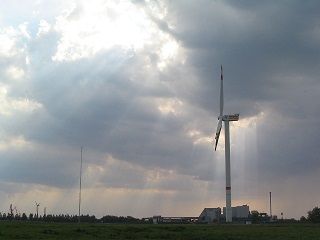Nuclear Energy’s Role Vis-à-vis Solar and Wind

The problem I have is that he likes to belittle solar and wind in order to strengthen his argument for nuclear. Here’s what I sent him and his team of 80 – 100 earlier today:
Sorry, Alex, I have a great deal of respect for you, but this concept that variable sources of energy like solar and wind have little, zero, or even negative value is not correct.
In 2013, wind was 4.18% of the total U.S. grid-mix. Yes, that doesn’t rival coal (in the high 30’s) or nuclear (in the high teens), but it’s huge, considering that wind’s rise to prominence has come in just the last few years–and it’s getting larger every year. The amount of CO2 it’s offsetting is an extremely important component of our attempt to deal with climate disruption.
Yes, it’s variable, but at this stage, it’s not hard for grid operators to incorporate. Even if it triples from here, which it will, there will still be absolutely no need for storage.
In 2013, solar counted for 0.23%, a slim fraction of wind, but, a) it mirrors load much more closely than wind, b) it too is gaining ground every month. It’s also true, as you point out, that rooftop installations require no additional land. I mention that even though land use per se, given our 3.5 million square miles in the continental U.S., is an unimportant factor in evaluating the merit of a given energy resource.
Having said all this, I want to present something I wrote earlier regarding the typical environmentalist anti-nuclear position. There are people who believe that “encouraging threat awareness on the subject of nuclear” is a good idea.
I’m not so sure. Let me start off with a statement that I know is controversial: “encouraging threat awareness” of nuclear in scientifically uninformed people poses its own threats, and those new threats are actually greater than those posed by nuclear energy in the first place.
I just wish there were a voice of reason in all this that objectively and honestly communicated the high-level truths:
- Yes, old nuclear reactor designs (and engineering, siting, etc.) contained what we now know to be errors that proved dangerous–and continue to represent danger. And yes, they are not at all cost-effective given the current milieu of energy options.
- Humankind needs to fight numerous energy battles simultaneously, by far the most important of which is replacing fossil fuels with low-carbon energy sources. The consequences of losing this battle are many orders of magnitude greater than those of continuing the operation of nuclear plants—even those of the 50-year-old design. There are numerous ways to get to this unpleasant conclusion, the most common of which (though it’s not completely valid) is to count the bodies, i.e., simply tally the cumulative deaths from all nuclear energy accidents vs. fossil fuels, where coal alone kills millions of people per year.
- Too-rapid a cessation of fossil energy without a viable replacement will also result in a level of suffering and death that are many orders of magnitude greater than anything that could possibly be caused by nuclear power.
- No one, even the most rabid and uninformed pro-nuke people, advocates perpetuating old designs. The subject of “advanced nuclear” represents incredible levels of forward progress in this space. In particular, liquid fluoride thorium reactors (LFTRs) hold the promise of extreme safety, scalability, and cost-effectiveness. Adherents claim that we’re five years and $5 billion dollars away from making this a reality. Obviously, most people (including me) think this is a gross exaggeration, but that alone is not a reason not to pursue this subject with as must ardor as we do “renewable energy.”
I know I share your viewpoint when I say that I am against all willful misleading of the public on either side of the debate. Both positions are irresponsible and morally wrong.
